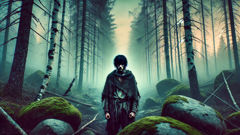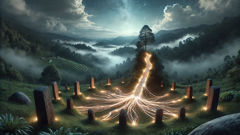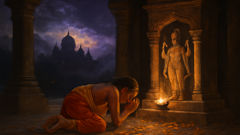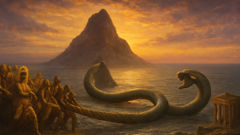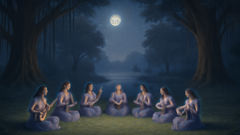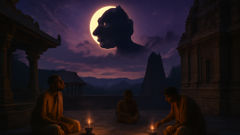Introduction
In the deep, silent forests of ancient Karelia, where silver birches whisper old sorrows and the lakes hold centuries of secrets beneath their mirrored surfaces, a singular tale is woven into the moss and stone. This is the story of Kullervo—a name carried in the shadows, uttered in lament, etched in the runes of the Finnish epic, the Kalevala. His life, marked by cruelty and loss from the very start, unfolds against a world where men and gods walk closely, and every fate is shaped by the hands of both kin and enemy. Kullervo is born to tragedy, his first breath drawn in a cottage under siege, his family scattered, and his father slain by the spiteful Untamo. Though rescued from the jaws of death, Kullervo’s childhood is steeped in hardship and humiliation, his soul forged in the fires of servitude and bitterness. Yet even as he grows beneath the shadow of his captors, a fierce, untamable spirit burns within him—a spirit that refuses to be broken, even as the world conspires to see him bent. As the years pass, Kullervo becomes a figure of uncanny strength and stubborn will. His story is a tapestry of vengeance, heartache, and relentless fate, each thread marked by betrayal and the echo of old wounds. Cast out from every place he tries to call home, Kullervo’s journey is shaped by the cruelties of others and the sharp edge of his own choices. In seeking justice, he becomes an instrument of destruction—of others and ultimately himself. The forests grow thicker and the roads darker as his tale unfolds, each step taking him further from the light and closer to a destiny that seems written in sorrow. Yet within this darkness, there is a strange beauty: the stark honesty of grief, the haunting music of loss, and the desperate hope that even a cursed soul might find peace. Kullervo’s legend, with all its pain and power, has echoed through centuries in the north, not just as a warning, but as a mirror to every heart that has raged against an unkind world. Through this retelling, you are invited into the ancient world of Finland—where destiny is as cold as winter wind, and love and vengeance are never far apart.
IV. The Sword and the Stone: Kullervo’s Last Stand
Kullervo’s footsteps led him deeper into the wilderness, far from villages and plowed fields, until only the cries of ravens and the slow drip of rain on moss kept him company. He moved like a specter among ancient stones, returning at last to the place where all sorrows began: his family’s ruined homestead. His mother greeted him with tears; his confession of guilt seemed only to deepen her suffering. Yet she pressed her son close before sending him away one last time—her voice a frail thread in the autumn gloom, urging him to seek peace if he could not find forgiveness.
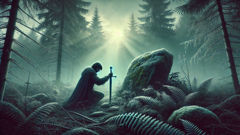
He wandered the borderlands between life and death for days. The land itself seemed changed—emptier, vaster, cold as a grave. Food was scarce. Nightmares dogged his sleep: flames devouring timber halls; Untamo’s laughter; the pale face of his sister vanishing beneath black water. Kullervo carried only his father’s sword and a single hope—that pain might at last be silenced.
He came at last to a sacred stone deep in the heart of the forest—a place where old gods were said to linger, where moss grew thick as velvet and wildflowers trembled even in still air. Here he rested for a while, laying his head against cool granite, eyes half-closed to the world. He spoke aloud to the wind, asking if any man could ever escape his fate; if forgiveness was possible for one so broken by grief and rage.
In that moment, a hush fell over the woods. Sunlight broke through the clouds in a thin beam, illuminating the sword in his hands. Kullervo rose slowly, feeling every ache in his battered body. With a voice both weary and defiant, he called out to his ancestors—to Kalervo, to his sister lost to the river, to all those whose lives had been ended by violence. He begged their pardon, swore that he had loved them even when he could only bring ruin.
He placed the hilt of his father’s sword against the stone and pressed his breast upon it. The blade bit deep—sharper than grief, colder than regret. As his blood darkened the moss, Kullervo felt the weight of sorrow slip away at last. The trees seemed to bend closer in mourning, their branches cradling his body as if he were at last a child at peace. Wolves howled somewhere in the distance. The wind carried his name away on a long, trembling sigh.
In time, travelers passing through those woods would speak of a haunted place where flowers never grew quite straight and the air was always tinged with sadness. Some claimed to have seen a pale figure wandering at dusk, searching for something lost beyond recall. But others said that Kullervo’s spirit was finally free—that he had found in death what life had never offered: forgiveness, and rest.
Conclusion
The forests of Finland hold many secrets—some lost in the depths of time, others echoed in every sigh of wind through the pines. Kullervo’s life ended as it began: alone beneath ancient trees, surrounded by shadows both real and remembered. After confessing his guilt to his grieving mother and learning that his brother too had perished, he wandered into the wilds one final time. On a cold morning, with frost silvering the ferns and the last leaves falling from the birches, he stopped at a sacred stone deep in the woods. There, raising his father’s sword high above his head, he spoke to the forest gods and to fate itself. His final words were a plea for release from pain—a hope that his tormented soul might find peace where life had given none. The blade flashed once in the thin sunlight, and Kullervo fell, his blood mingling with the earth that had always refused him rest. So ended the most tragic of Finland’s heroes—a boy shaped by loss and vengeance, whose every choice led him deeper into darkness. Yet in his story lies a strange kind of grace: a warning against cruelty and revenge, but also a testament to the fierce spirit that refuses to surrender, even when hope is lost. The old songs still remember him. In every gust that stirs the ancient woods, there is a whisper of Kullervo’s name—a reminder that even in deepest sorrow, there is meaning to be found.

